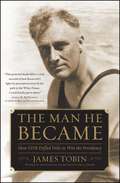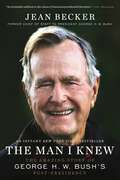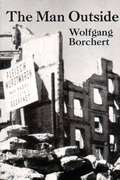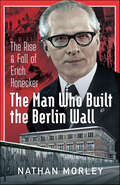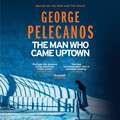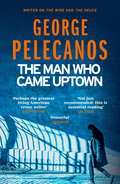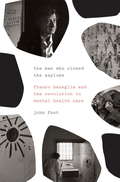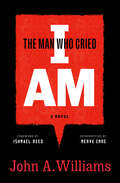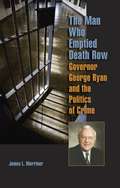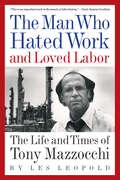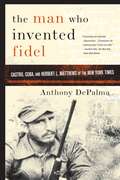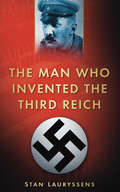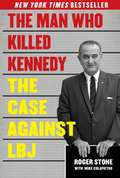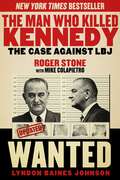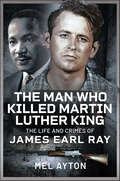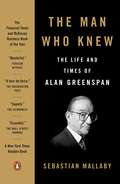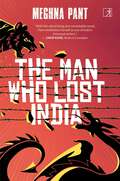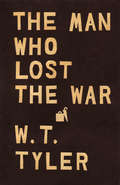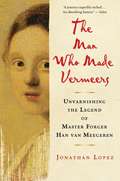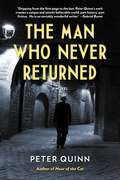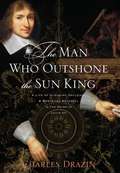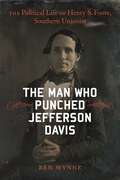- Table View
- List View
The Man He Became
by James TobinWith a searching new analysis of primary sources, NBCC award winner James Tobin reveals how FDR's fight against polio transformed him from a callow aristocrat into the energetic, determined statesman who would rally the nation in the Great Depression and lead it through World War II.When polio paralyzed Franklin Roosevelt at thirty-nine, people wept to think that the young man of golden promise must live out his days as a helpless invalid. He never again walked on his own. But in just over a decade, he had regained his strength and seized the presidency. This was the most remarkable comeback in the history of American politics. And, as author James Tobin shows, it was the pivot of Roosevelt's life--the triumphant struggle that tempered and revealed his true character. With enormous ambition, canny resourcefulness, and sheer grit, FDR willed himself back into contention and turned personal disaster to his political advantage. Tobin's dramatic account of Roosevelt's ordeal and victory offers central insights into the forging of one of our greatest presidents.
The Man I Knew: The Amazing Story of George H. W. Bush's Post-Presidency
by Jean BeckerA heartfelt portrait of President George H.W. Bush—and his post-presidential life—by the confidante who knew him best. <P><P><b>A New York Times Best Seller</b>
The Man Outside
by Wolfgang Borchert David PorterBochert speaks about WWII, its victims and repercussions.
The Man Who Built the Berlin Wall: The Rise & Fall of Erich Honecker
by Nathan MorleyThe first ever English language biography of Erich Honecker, covering his entire life and career. In The Man Who Built the Berlin Wall, Nathan Morley brings to life the story of the longtime leader of the German Democratic Republic. Drawing from a wealth of untapped archival sources – and firsthand interviews with Honecker’s lawyers, journalists, and contemporary witnesses – Morley paints a vivid portrait of how an uneducated miner’s son from the Saarland rose to the highest ranks of the German Communist Party. Having survived a decade of brutality in Nazi prisons, Honecker emerged as an ambitious political player and became the shadowy mastermind behind the construction of the Berlin Wall in 1961, a crucial moment in twentieth-century history. Although frequently on the verge of being relegated to obscurity, he managed to overthrow strongman Walter Ulbricht at the height of the Cold War and reigned supreme over the GDR between 1971-1989. However, by 1980, the Honecker honeymoon was on the wane as a decade of economic and social difficulties blighted the GDR. Then, as tumultuous changes swept through the Soviet bloc, everything in and around him collapsed in 1989. His health, his certainties, his ideology, his apparatus of power, and his beloved SED party. Terminally ill, he was literally kidnapped from Russia to answer for his crimes in a Berlin court. A controversial figure, Honecker’s notorious philandering, his difficult relationship with his wife Margot, penchant for porn, addiction to hunting, and gilded lifestyle at a forest settlement north of Berlin are all brought into sharp focus. Although haunted by the fall of the Berlin Wall, Erich Honecker died in 1994, still believing the GDR was the envy of the world.
The Man Who Built the Sierra Club: A Life of David Brower
by Robert WyssDavid Brower (1912–2000) was a central figure in the modern environmental movement. His leadership, vision, and elegant conception of the wilderness forever changed how we approach nature. In many ways, he was a twentieth-century Thoreau. Brower transformed the Sierra Club into a national force that challenged and stopped federally sponsored projects that would have dammed the Grand Canyon and destroyed hundreds of millions of acres of our nation's wilderness. To admirers, he was tireless, passionate, visionary, and unyielding. To opponents and even some supporters, he was contentious and polarizing.As a young man growing up in Berkeley, California, Brower proved himself a fearless climber of the Sierra Nevada's dangerous peaks. After serving in the Tenth Mountain Division during World War II, he became executive director of the Sierra Club. This uncompromising biography explores Brower's role as steward of the modern environmental movement. His passionate advocacy destroyed lifelong friendships and, at times, threatened his goals. Yet his achievements remain some of the most important triumphs of the conservation movement. What emerges from this unique portrait is a rich and robust profile of a leader who took up the work of John Muir and, along with Rachel Carson, made environmentalism the cause of our time.
The Man Who Came Uptown: One of The Times ‘Best Crime Novels of the Decade'
by George PelecanosAnna Byrne is a jailhouse librarian. Most days, she loves her job and shares the life-affirming power of books to people who would have no hope without them. Often, she can get too close and forget some of these men are dangerous criminals.But some of them never had a chance. Like Michael Hudson, who's been locked up awaiting trial before his sudden release. He's happy and relieved but can't shake the question preying on his mind: how comes the witness who put him behind bars is suddenly refusing to testify?There's a man who might have the answer, but he wants something first. Phil Ornazian is a private investigator who moonlights as a petty criminal. He's not exactly proud of it, but times are hard in Washington D.C. People have to change to survive, or die trying.But everything comes at a price and, at some point, everyone has to pay...
The Man Who Came Uptown: One of The Times ‘Best Crime Novels of the Decade’
by George PelecanosFrom writer and producer on HBO's THE WIRE and THE DEUCE comes one of the most critically-acclaimed crime novels of the year:'He is, quite simply, among America's finest crime writers. This latest story does not disappoint ... lyrical, beautifully observed and constantly surprising, it is a delight' Daily Mail'In his first novel for five years, Pelecanos demonstrates why he deserves to be regarded as one of the best American crime novelists ... It's a moving tale, beautifully told' The Times* * * * *Anna Byrne is a jailhouse librarian. In a place where hope is hard to find, the power of books can be a light in the dark. For some of the prisoners, her work is life-changing.Like Michael Hudson, her best student, who's been locked up awaiting trial before his sudden release. He's relieved to be free - to 'come uptown', as they say - but can't shake the question: why is the witness who put him behind bars is suddenly refusing to testify? There's a man who might have the answer, but he wants something first. Phil Ornazian is a private investigator who moonlights as a petty criminal. He's not exactly proud of it, but times are hard in Washington, D.C. People have to change to survive, or die trying.But everything comes at a price and, at some point, everyone has to pay...* * * * *Praise for George Pelecanos: 'Perhaps the greatest living American crime writer' Stephen King 'Outstanding' Sunday Telegraph 'Powerful' Observer'American crime writing at its finest' Independent on Sunday'Terrific' Elmore Leonard 'Powerful' Michael Connelly 'I love the way he writes: economical, rhythmic, elliptical and angrily political' Val McDermid'Hard-boiled fiction with heart' Sunday Telegraph'Pelecanos has joined James Lee Burke and Lawrence Block at the high table of contemporary crime greats' The Times'The coolest writer in America' GQ 'Gold-standard character-driven crime writing that few will ever match' Financial Times
The Man Who Closed the Asylums: Franco Basaglia and the Revolution in Mental Health Care
by John FootWhen the wind of the 1960s blew through the world of psychiatry In 1961, when Franco Basaglia arrived outside the grim walls of the Gorizia asylum, on the Italian border with Yugoslavia, it was a place of horror, a Bedlam for the mentally sick and excluded, redolent of Basaglia's own wartime experience inside a fascist gaol. Patients were frequently restrained for long periods, and therapy was largely a matter of electric and insulin shocks. The corridors stank, and for many of the interned the doors were locked for life. This was a concentration camp, not a hospital.Basaglia, the new Director, was expected to practise all the skills of oppression in which he had been schooled, but he would have none of this. The place had to be closed down by opening it up from the inside, bringing freedom and democracy to the patients, the nurses and the psychiatrists working in that "total institution."Inspired by the writings of authors such as Primo Levi, R.D. Laing, Erving Goffman, Michel Foucault and Frantz Fanon, and the practices of experimental therapeutic communities in the UK, Basaglia's seminal work as a psychiatrist and campaigner in Gorizia, Parma and Trieste fed into and substantially contributed to the national and international movement of 1968. In 1978 a law was passed (the "Basaglia law") which sanctioned the closure of the entire Italian asylum system.The first comprehensive study of this revolutionary approach to mental health care, The Man Who Closed the Asylums is a gripping account of one of the most influential movements in twentieth-century psychiatry, which helped to transform the way we see mental illness. Basaglia's work saved countless people from a miserable existence, and his legacy persists, as an object lesson in the struggle against the brutality and ignorance that the establishment peddles to the public as common sense.From the Hardcover edition.
The Man Who Cried I Am: A Novel
by John A. WilliamsRediscover the sensational 1967 literary thriller that captures the bitter struggles of postwar Black intellectuals and artistsWith a foreword by Ishmael Reed and a new introduction by Merve Emre about how this explosive novel laid bare America's racial fault linesMax Reddick, a novelist, journalist, and presidential speechwriter, has spent his career struggling against the riptide of race in America. Now terminally ill, he has nothing left to lose. An expat for many years, Max returns to Europe one last time to settle an old debt with his estranged Dutch wife, Margrit, and to attend the Paris funeral of his friend, rival, and mentor Harry Ames, a character loosely modelled on Richard Wright.In Amsterdam, among Harry&’s papers, Max uncovers explosive secret government documents outlining &“King Alfred,&” a plan to be implemented in the event of widespread racial unrest and aiming &“to terminate, once and for all, the Minority threat to the whole of the American society.&” Realizing that Harry has been assassinated, Max must risk everything to get the documents to the one man who can help.Greeted as a masterpiece when it was published in 1967, The Man Who Cried I Am stakes out a range of experience rarely seen in American fiction: from the life of a Black GI to the ferment of postcolonial Africa to an insider&’s view of Washington politics in the era of segregation and the Civil Rights Movement, including fictionalized portraits of Martin Luther King, Jr., and Malcolm X. John A. Williams and his lost classic are overdue for rediscovery.Few novels have so deliberately blurred the boundaries between fiction and reality as The Man Who Cried I Am (1967), and many of its early readers assumed the King Alfred plan was real. In her introduction, Merve Emre examines the gonzo marketing plan behind the novel that fueled this confusion and prompted an FBI investigation. This deluxe paperback also includes a new foreword by novelist Ishmael Reed.&“It is a blockbuster, a hydrogen bomb . . . . This is a book white people are not ready to read yet, neither are most black people who read. But [it] is the milestone produced since Native Son. Besides which, and where I should begin, it is a damn beautifully written book.&” —Chester Himes&“Magnificent . . . obviously in the Baldwin and Ellison class.&” —John Fowles&“If The Man Who Cried I Am were a painting it would be done by Brueghel or Bosch. The madness and the dance is never-ending display of humanity trying to creep past inevitable Fate.&” —Walter Mosely
The Man Who Didn't Shoot Hitler: The Story of Henry Tandey VC and Adolf Hitler, 1918
by David JohnsonThis is the tale of two men.The first is Henry Tandey, an ordinary man later deemed to be ‘a hero of the old berserk type’, born and brought up in Leamington Spa, Warwickshire, who displayed extraordinary courage to emerge from the First World War as the most decorated British private to survive. The second is Adolf Hitler, who was highly decorated in his service to Germany in the First World War and went on to become one of the most infamous dictators in history, later bringing the world to the brink of destruction during the Second World War. It seems unlikely that their fates should collide. Yet in 1938 Hitler named Tandey as the soldier who spared his life on 28 September 1918 in the aftermath of the Battle of Marcoing – an assertion that came as a surprise to Tandey himself. The Man Who Didn’t Shoot Hitler tells the story of Tandey’s and Hitler’s Great War, the moment when their lives became intertwined – if in fact they did – and how Tandey lived with the stigma of being known not for his chestful of medals for gallantry in service of King and Country, but as the man who let Hitler live.
The Man Who Emptied Death Row: Governor George Ryan and the Politics of Crime
by James L. MerrinerGeorge H. Ryan, Illinois governor from 1999 to 2003, became nationally known for two significant and very different reasons. The first governor in the United States to clear out his state's death row and put a moratorium on the death penalty, he was also convicted and sent to prison on corruption charges. The Man Who Emptied Death Row: Governor George Ryan and the Politics of Crime details the career of a man who both enhanced and tarnished the image of the highest office in Illinois and examines the political history and culture that shaped him. Author James L. Merriner explores the two very different stories of George Ryan: the brave crusader against the death penalty and the petty crook. An extensive analysis of the official record, exclusive interviews, and previously undisclosed incidents in Ryan's career expose why the governor pardoned or commuted the sentences of all 171 prisoners on Illinois's death row before leaving office and how he later was convicted of eighteen counts of official corruption. This biography traces Ryan's family history and the Illinois political climate that influenced his development as a politician. Although Ryan championed "good-government" initiatives--organ donations, tougher drunken-driving and lobbyist disclosure laws--he never overcame a reputation as a wheeler-dealer, notes Merriner. Merriner goes beyond Ryan's life and career to explore the politics of crime, highlighting the successes and failures of the criminal justice system and suggesting how both white-collar fraud and violent crime shape politics. A fascinating story that reveals much about the way Illinois politics works, The Man Who Emptied Death Row will help determine how history will judge Illinois governor George Ryan.
The Man Who Hated Work and Loved Labor: The Life and Times of Tony Mazzocchi
by Les LeopoldA CIA-connected labor union, an assassination attempt, a mysterious car crash, listening devices, and stolen documents--everything you'd expect from the latest thriller. Yet, this was the reality of Tony Mazzocchi, the Rachel Carson of the U.S. workplace; a dynamic labor leader whose legacy lives on in today's workplaces and ongoing alliances between labor activists and environmentalists, and those who believe in the promise of America.In The Man Who Hated Work and Loved Labor: The Life and Times of Tony Mazzocchi, author and labor expert Les Leopold recounts the life of the late Oil, Chemical, and Atomic Workers Union leader. Mazzocchi's struggle to address the unconscionable toxic exposure of tens of thousands of workers led to the passage of the Occupational Safety and Health Act and included work alongside nuclear whistleblower Karen Silkwood. His noble, high-profile efforts forever changed working conditions in American industry--and made him enemy number one to a powerful few.As early as the 1950s, when the term "environment" was nowhere on the political radar, Mazzocchi learned about nuclear fallout and began integrating environmental concerns into his critique of capitalism and his union work. An early believer in global warming, he believed that the struggle of capital against nature was the irreconcilable contradiction that would force systemic change.Mazzocchi's story of non-stop activism parallels the rise and fall of industrial unionism. From his roots in a pro-FDR, immigrant family in Bensonhurst, Brooklyn, through McCarthyism, the Sixties, and the surge of the environmental movement, Mazzocchi took on Corporate America, the labor establishment and a complacent Democratic Party.This profound biography should be required reading for those who believe in taking risks and making the world a better place. While Mazzocchi's story is so full of peril and deception that it seems almost a work of fiction, Leopold proves that the most provocative and lasting stories in life are those of real people.
The Man Who Invented Fidel
by Anthony DepalmaIn 1957, Herbert L. Matthews of the New York Times, then considered one of the premiere foreign correspondents of his time, tracked down Fidel Castro in Cuba's Sierra Maestra mountains and returned with what was considered the scoop of the century. His heroic portrayal of Castro, who was then believed dead, had a powerful effect on American perceptions of Cuba, both in and out of the government, and profoundly influenced the fall of the Batista regime. When Castro emerged as a Soviet-backed dictator, Matthews became a scapegoat; his paper turned on him, his career foundered, and he was accused of betraying his country. In this fascinating book, New York Times reporter DePalma investigates the Matthews case to reveal how it contains the story not just of one newspaperman but of an age, not just how Castro came to power but how America determines who its enemies are. He re-creates the atmosphere of revolutionary Cuba and Cold War America, and clarifies the facts of Castro's ascension and political evolution from the many myths that have sprung up around them. Through a dramatic, ironic, in ways tragic story, The Man Who Invented Fidel offers provocative insights into Cuban politics, the Cuban-American relationship, and the many difficult balancing acts of responsible journalism.
The Man Who Invented the Third Reich
by Stan LauryssensArthur Moeller van den Bruck was a prolific writer, historian, art critic, translator and publisher; the quintissential Bohemian fin-de-siecle artist. In the turbulent years that followed the end of the First World War, he became politically active as the leader of the young conservative revolutionaries in Weimar Germany. Moeller van den Bruck expressed his ideas for a German authoritarian state in his major work Das Dritte Reich (The Third Reich), first published in 1923. Adolf Hitler was profoundly influenced by the ideas that Das Dritte Reich and regarded himself as the activist who could implement them. As Moeller van den Bruck watched Hitler become the personification of the violent dynamism he had recommended in his book, he anticipated the horrors to come and saw no way out by to commit suicide. This remarkable biography gives a compelling insight into the tragic life of Moeller van den Bruck and uses personal interviews with contemporaries such as Kafka, Munch and Dietrich to explore the political and artistic whirlpools of Weirmar Germany in which he lived.
The Man Who Killed Kennedy
by Mike Colapietro Roger StoneLyndon Baines Johnson was a man of great ambition and enormous greed, both of which, in 1963, would threaten to destroy him. In the end, President Johnson would use power from his personal connections in Texas and from the underworld and from the government to escape an untimely end in politics and to seize even greater power. President Johnson, the thirty-sixth president of the United States, was the driving force behind a conspiracy to murder President John F. Kennedy on November 22, 1963.In The Man Who Killed Kennedy, you will find out how and why he did it.Political consultant, strategist, and Libertarian Roger Stone has gathered documents and used his firsthand knowledge to construct the ultimate tome to prove that LBJ was not only involved in JFK's assassination, but was in fact the mastermind.With 2013 being the fiftieth anniversary of JFK's assassination, this is the perfect time for The Man Who Killed Kennedy to be available to readers. The research and information in this book is unprecedented, and as Roger Stone lived through it, he's the perfect person to bring it to everyone's attention.
The Man Who Killed Kennedy: The Case Against LBJ
by Mike Colapietro Roger Stone"We appreciate Roger Stone, he is one tough cookie." - President TrumpThe sensational New York Times bestseller, now in paperback.Find out how and why LBJ had JFK assassinated.The Man Who Killed Kennedy: The Case Against LBJ hit the New York Times bestseller list the week of the 50th Anniversary of the assassination of President John F. Kennedy. Consummate political insider Roger Stone makes a compelling case that Lyndon Baines Johnson had the motive, means, and opportunity to orchestrate the murder of JFK. Stone maps out the case that LBJ blackmailed his way on the ticket in 1960 and was being dumped in 1964 to face prosecution for corruption at the hands of his nemesis attorney Robert Kennedy. Stone uses fingerprint evidence and testimony to prove JFK was shot by a long-time LBJ hit man-not Lee Harvey Oswald.President Johnson would use power from his personal connections in Texas, from the criminal underworld, and from the United States government to escape an untimely end in politics and to seize even greater power. President Johnson, the thirty-sixth president of the United States, was the driving force behind a conspiracy to murder President Kennedy on November 22, 1963.In The Man Who Killed Kennedy, you will find out how and why he did it.Legendary political operative and strategist Roger Stone has gathered documents and uses his firsthand knowledge to construct the ultimate tome to prove that LBJ was not only involved in JFK’s assassination, but was in fact the mastermind.Skyhorse Publishing, as well as our Arcade imprint, are proud to publish a broad range of books for readers interested in history--books about World War II, the Third Reich, Hitler and his henchmen, the JFK assassination, conspiracies, the American Civil War, the American Revolution, gladiators, Vikings, ancient Rome, medieval times, the old West, and much more. While not every title we publish becomes a national bestseller, we are committed to books on subjects that are sometimes overlooked and to authors whose work might not otherwise find a home.
The Man Who Killed Martin Luther King: The Life and Crimes of James Earl Ray
by Mel AytonDoubts about James Earl Ray, Dr. Martin Luther King’s lone assassin, arose almost immediately after the civil rights leader was fatally shot on the balcony of the Lorraine Motel in Memphis on 4 April 1968. From the start, his aides voiced suspicions that a conspiracy was responsible for their leader’s death. Over time many Americans became convinced the government investigations covered up the truth about the alleged assassin. Exactly what led Ray to kill King continues to be a source of debate, as does his role in the murder. However, Mel Ayton believe the answers to the many intriguing questions about Ray and how conspiracy ideas flourished can now be fully understood. Missing from the wild speculations over the past fifty-two years has been a thorough investigation of the character of King’s assassin. Additionally, the author examines exactly how the conspiracy notions came about and the falsehoods that led to their promulgation. The Man Who Killed Martin Luther King is the first full account of the life of James Earl Ray based on scores of interviews provided to government and non-government investigators and from the FBI’s and Scotland Yard’s files plus the recently released Tennessee Department of Corrections prison record on Ray. Most importantly, the testimony of Anna Sandhu has often been ignored by writers but her story is crucial in gaining an understanding of Ray’s deceptive ways. A courtroom artist, who, after listening to Ray’s story, later married him. Also missing from accounts of the alleged ‘conspiracy’ is the story told to this author by Brushy Mountain State Penitentiary Deputy Warden Rolland H. Cisson, which decisively renders Ray’s claims of innocence to be bogus. In the short-lived freedom he acquired after escaping from the Missouri State Penitentiary in 1967, following being sentenced to twenty years in prison for repeated offenses, he traveled to Los Angeles and decided to seek notoriety as the one who would stalk and kill Dr. King, who he had come to hate vehemently. From the time of King’s murder, the reader will follow Ray to solitary confinement in a Nashville prison. Then, six years later, on 10 June 1977, James Earl Ray again escaped from prison, this time with five others. Ray was the last to be recaptured, having survived only on wheatgerm. Finally, the book relays Ray’s stabbing by several black inmates, then his resulting diagnosis with Hepatitis C, which caused his death twelve years later, in 1998.
The Man Who Knew: The Life and Times of Alan Greenspan
by Sebastian MallabyThe definitive biography of the most important economic statesman of our time Sebastian Mallaby's magisterial biography of Alan Greenspan, the product of over five years of research based on untrammeled access to his subject and his closest professional and personal intimates, brings into vivid focus the mysterious point where the government and the economy meet. To understand Greenspan's story is to see the economic and political landscape of the last 30 years--and the presidency from Reagan to George W. Bush--in a whole new light. As the most influential economic statesman of his age, Greenspan spent a lifetime grappling with a momentous shift: the transformation of finance from the fixed and regulated system of the post-war era to the free-for-all of the past quarter century. The story of Greenspan is also the story of the making of modern finance, for good and for ill. Greenspan's life is a quintessential American success story: raised by a single mother in the Jewish émigré community of Washington Heights, he was a math prodigy who found a niche as a stats-crunching consultant. A master at explaining the economic weather to captains of industry, he translated that skill into advising Richard Nixon in his 1968 campaign. This led to a perch on the White House Council of Economic Advisers, and then to a dazzling array of business and government roles, from which the path to the Fed was relatively clear. A fire-breathing libertarian and disciple of Ayn Rand in his youth who once called the Fed's creation a historic mistake, Mallaby shows how Greenspan reinvented himself as a pragmatist once in power. In his analysis, and in his core mission of keeping inflation in check, he was a maestro indeed, and hailed as such. At his retirement in 2006, he was lauded as the age's necessary man, the veritable God in the machine, the global economy's avatar. His memoirs sold for record sums to publishers around the world. But then came 2008. Mallaby's story lands with both feet on the great crash which did so much to damage Alan Greenspan's reputation. Mallaby argues that the conventional wisdom is off base: Greenspan wasn't a naïve ideologue who believed greater regulation was unnecessary. He had pressed for greater regulation of some key areas of finance over the years, and had gotten nowhere. To argue that he didn't know the risks in irrational markets is to miss the point. He knew more than almost anyone; the question is why he didn't act, and whether anyone else could or would have. A close reading of Greenspan's life provides fascinating answers to these questions, answers whose lessons we would do well to heed. Because perhaps Mallaby's greatest lesson is that economic statesmanship, like political statesmanship, is the art of the possible. The Man Who Knew is a searching reckoning with what exactly comprised the art, and the possible, in the career of Alan Greenspan.From the Hardcover edition.
The Man Who Lost India
by Meghna PantThe year is 2032. China declares war on India. Pillage and plunder ensues. The war comes to an abrupt halt when a supernatural event saves the obscure town of Lalbag from annihilation. Even as China renews its efforts to invade Lalbag, a greater calamity awaits this sleepy town. A Chinese cop stumbles upon a dangerous secret that threatens to end the town&’s immunity. A fierce and forbidden love between a servant and his mistress destroys two families. Meanwhile, the town&’s richest man becomes afflicted with a terrible disease, the town beauty goes mad when her love betrays, and a psychic turns water into blood, sending the town and its people deeper into tragedy. A dystopian never-been-done-before tale set in – and between – China and India, The Man Who Lost India is a powerful portrayal of love, strife and family in the wake of 21st century&’s biggest war. Incantatory and atmospheric, this is Meghna Pant&’s most ambitious novel yet, full of beauty, bloodshed and undeniable feminist power.
The Man Who Lost the War
by W. T. TylerSet in post-war Berlin, a disillusioned former CIA operative and a Russian spy cross paths in their search for an elusive double agent.
The Man Who Loved Dogs
by Anna Kushner Leonardo PaduraThe story of Ramon Mercader, the assassin of Trotsky. Moving seamlessly between Cuba where Mercader lived out the last years of his life, Mercader's early years in Spain and France, and Trotsky's long years of exile, it is the story of revolutions fought and betrayed, the ways in which men's which men's political convictions are continually tested and manipulated.
The Man Who Made Vermeers: Unvarnishing The Legend Of Master Forger Han Van Meegeren
by Jonathan LopezIt's a story that made Dutch painter Han van Meegeren famous worldwide when it broke at the end of World War II: A lifetime of disappointment drove him to forge Vermeers, one of which he sold to Hermann Goering in mockery of the Nazis. And it's a story that's been believed ever since. Too bad it isn't true. Jonathan Lopez has drawn on never-before-seen documents from dozens of archives to write a revelatory new biography of the world's most famous forger. Neither unappreciated artist nor antifascist hero, Van Meegeren emerges as an ingenious, dyed-in-the-wool crook-a talented Mr. Ripley armed with a paintbrush. Lopez explores a network of illicit commerce that operated across Europe: Not only was Van Meegeren a key player in that high-stakes game in the 1920s and '30s, landing fakes with famous collectors such as Andrew Mellon, but he and his associates later cashed in on the Nazi occupation. The Man Who Made Vermeers is a long-overdue unvarnishing of Van Meegeren's legend and a deliciously detailed story of deceit in the art world.
The Man Who Never Returned (The Fintan Dunne Trilogy)
by Peter QuinnPeter Quinn’s The Man Who Never Returned is a noir-ish, stylized detective narrative set in 1950s New York. It follows Fintan, a retired detective turned private investigator who has been given the job of finding Judge Crater, who just went missing in 1930. Based on a real story, it is quite an intriguing tale that was even more so for people living at the time. The famous missing-person case is comparable to the Amelia Earhart missing-person case, though it could have been an even more interesting one. It was alleged that the missing judge may have had information about underhanded dealings in the New York judiciary. It was believed that if such information came to light, Franklin D. Roosevelt, then governor of New York, would have had a hard time becoming the president of the United States. There were also rumors that the judge, who was a known ladies’ man, had either decided to disappear or had fallen afoul of the mafia. Featuring hardboiled characters and a beautiful re-creation of New York from the ’50s, it is quite a compelling read.
The Man Who Outshone the Sun King: A Life of Gleaming Opulence and Wretched Reversal in the Reign of Louis XIV
by Charles DrazinA richly textured biography of seventeenth-century minister Nicolas Fouquet, whose cunning and charisma brought him vast wealth and wide-ranging fame and, eventually, his own destruction
The Man Who Punched Jefferson Davis: The Political Life of Henry S. Foote, Southern Unionist (Southern Biography Series)
by Ben WynneRegarded as one of the most vocal, well-traveled, and controversial statesmen of the nineteenth century, antebellum politician Henry Stuart Foote played a central role in a vast array of pivotal events. Despite Foote’s unique mark on history, until now no comprehensive biography existed. Ben Wynne fills this gap in his examination of the life of this gifted and volatile public figure in The Man Who Punched Jefferson Davis: The Political Life of Henry S. Foote, Southern Unionist.An eyewitness to many of the historical events of his lifetime, Foote, an opinionated native Virginian, helped to raise money for the Texas Revolution, provided political counsel for the Lone Star Republic’s leadership before annexation, and published a 400-page history of the region. In 1847, Mississippi elected him to the Senate, where he promoted cooperation with the North during the Compromise of 1850. One of the South’s most outspoken Unionists, he infuriated many of his southern colleagues with his explosive temperament and unorthodox ideas that quickly established him as a political outsider. His temper sometimes led to physical altercations, including at least five duels, pulling a gun on fellow senator Thomas Hart Benton during a legislative session, and engaging in run-ins with other politicians—notably a fistfight with his worst political enemy, Jefferson Davis. He left the Senate in 1851 to run for governor of Mississippi on a pro-Union platform and defeated Davis by a small margin. Several years later, Foote moved to Nashville, was elected to the Confederate Congress after Tennessee seceded, and continued his political sparring with the Confederate president.From Foote’s failed attempt to broker an unauthorized peace agreement with the Lincoln government and his exile to Europe to the publication of his personal memoir and his appointment as director of the United States mint in New Orleans, Wynne constructs an entertaining and nuanced portrait of a singular man who constantly challenged the conventions of southern and national politics.
